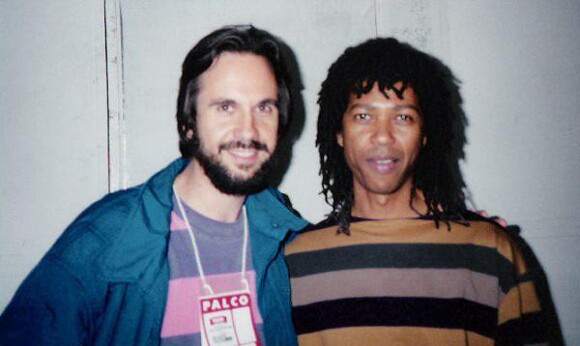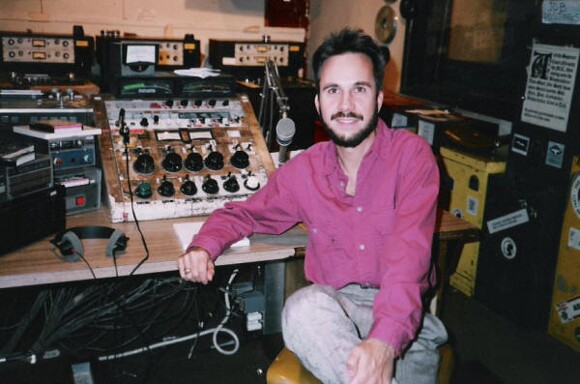An Ambassador of Sound: Sergio Mielniczenko's Brazilian Hour

Inside the doors of Sergio Mielniczenko's studio lies a music lover's paradise. His white walls are sprawling with musical mementos: rare festival posters, decades-old newspaper clippings, colorful Kodaks of famous South American singers. Glossy headshots are autographed by the greats: Herbie Hancock, Sérgio Mendes, Michael Jackson. Cued up on a computer screen are hours upon hours of digital playlists, sampling bossa nova and bass-thumping funk, upbeat Brazilian pop tunes and sultry Rio jazz. In the back, a tiny library houses an astounding number of CDs -- easily 30 thousand, at the very least -- lining shelves, overflowing from boxes, uneasily stacked in Pisa-like towers.
For Mielniczenko, this is his home base, the place where he creates. Since 1978, he's been the host and producer of the "Brazilian Hour," a biweekly KXLU radio program that showcases the best of Brazilian music. The show is based at Brazil's consulate in Beverly Hills, but its reach is much wider; it's distributed to more than 40 public radio stations across the United States, stretching from Alaska to Brooklyn. Mielniczenko started the program in his early twenties as a Cal State Northridge sophomore and recent São Paulo transplant. He was new to the world of production and put in the extra work: practicing his turntable skills, staying up till sunrise to edit interviews. In the '80s, the era of tape recordings, he'd spend hours meticulously splicing sections of tape with a razor, then pasting them together, to create his segments. Now, 35 years later, he's a prominent fixture in California's radio scene. In many ways, Mielniczenko is America's unofficial ambassador of Brazilian music; he acts as the bridge between two cultures, bringing bossa nova tunes to eager US listeners. The "Brazilian Hour" is America's gateway to the sounds of South America, and Mielniczenko holds the key.

Frequent listeners of the "Brazilian Hour" are familiar with Sergio's voice: soft, smooth, and extremely knowledgable. When songs transition, switching from upbeat to soulful, or from romantic instrumentals to MPB, he takes the mic, adding his insights about the next tune to come. Mielniczenko discusses the artists he plays -- their hometowns, their backstories, their discographies -- in impressive detail. He'll often give listeners mini-lessons on Brazilian musical favorites, like Djavan, João Bosco, Ivete Sangalo, or Ivan Lins. Most Brazil natives know these names by heart, and don't necessarily need Sergio to explain -- but it's not them that he's is trying to engage. He's reaching out to the new, American listeners, the uninitiated, who may have stumbled upon a samba while turning their radio dial, then paused out of curiosity. "When people, through the arts, start to understand your country, you're making friends," he explains. "There's nothing more beautiful than exposing the arts, the music, and the culture of where you come from. [Brazilian music] is the closest you get to the real, to who we are... So I think that's a very important thing: to try to bring Brazil closer to the ones that are not close to Brazil."


When he first moved to Los Angeles in 1974, Mielniczenko was hard-pressed to find pieces of his own culture within the city's musical landscape. Besides the occasional bossa nova tune on a jazz station, Americans were still relatively unfamiliar with Brazilian song. With no real outlet to connect to their roots, L.A.'s Brazilian expatriate community banded together. "The Brazilians in Los Angeles all knew each other in those days," says Mielniczenko. "It was such a small community. We knew the doctor, we knew the businesses, we knew the travel agent." Through a mailing list, they would organize get-togethers, the biggest being an annual carnival at the Hilton Hotel. For one night a year, a few hundred Brazilians could meet, greet, and dance to the music that felt like home.
"I know how important [music] is for Brazilians who are homesick," says Mielniczenko, "whether they're trying to make it in the US, going to school, getting a job -- it doesn't matter. The music is a great connection to our culture. So it's fulfilling to know that any Brazilian, anywhere in the world right now, can tune in [to the 'Brazilian Hour' online] and listen to our programming."
Music is truly the heartbeat of Brazil, the soundtrack to every public moment. "You find music everywhere," says Mielniczenko. "If you go to a soccer game, people are singing, chanting the songs. If you go to a political rally, there's these incredible songs of protest." As a kid, Mielniczenko was swept up in the world of sound. He attended music school, formed multiple rock bands, and played his guitar at São Paulo festivals. Even throughout his adult life, he's continued to compose. In 1983, he wrote a hit single for pop/rock four-piece Radio Taxi, and in 2010, he worked on the tracks for a Brazilian romantic comedy.
Being a professional musician -- "or at least having tried," he adds modestly -- is what sets the radio host apart. His on-air interviews with other singers and songwriters are famously candid, quickly turning into deep, winding conversations about ambition, passion, and the trials and tribulations of the industry. "The connection exists immediately," says Mielniczenko. "I truly understand what it is to be a musician, to be an artist, what it takes. It's an effort, a life thing. You have to dive into it. We [talk about] the ups and downs, and the challenges of realizing the dream. And that, to me, is the most precious thing that I have -- to have had the experience of being a musician."

Even after hours, Mielniczenko's musical brain is still running. At the back of his mind, his creative itch lingers, ready to emerge at a moment's notice. Sometimes, he'll be walking down the Venice boardwalk, then suddenly freeze, as he hears a street performer singing beautifully. Something unexplainable clicks in his brain -- he knows their music is remarkable. "You don't even have to be looking," he says. "If you're walking by a club [and hear it], it's automatic. If you're listening to something and it's interesting, you don't have to think. You already know."
When searching for the best new Brazilian music, Sergio looks everywhere for this gut feeling, this overwhelming moment of clarity. He frequents jazz clubs, speakeasies, and small shows around town with Brazilian performers. He hands business cards to bands at Third Street Promenade that catch his attention. He even flies to Brazil, making the rounds, talking to record labels, asking, "What's new? Who's the next big thing?" The core of the "Brazilian Hour" is in the genre's classics -- jazzy standards like "The Girl from Ipanema" will always have a place in his playlists -- but it's the new, the next, the up-and-coming, that excites Mielniczenko and continues to drive his show forward.
One thing that's made his search for new talent significantly easier is the digital age. Instead of visiting clubs or studios, Sergio can find music through countless digital platforms: Youtube, Soundcloud, Bandcamp, Myspace... the list goes on. It's a far leap from 1978, the year the "Brazilian Hour" started, a time of vinyl turntables and reel-to-reel tape decks. Now, a single press of a button will play the "Brazilian Hour" from an iPhone app. Aspiring singers can bypass record labels and shoot to stardom by making Youtube videos in their bedroom. "The rules have changed," he says. "Everything's so different... Even if you don't know anything about music, you can get Garage Band, and you can write a song."

Recently, Mielniczenko's been getting emails from Brazilian-born musicians across the world, asking for him to play their original songs on the "Brazilian Hour." The tracks he's sent aren't always radio-ready, but many are full of potential. Once, five years ago, a father sent Sergio a recording of his two children, Laura and Lucas Rizzotto, making music. Laura's voice struck Sergio -- her soprano was clear and polished, especially for her young age -- so he decided to play their song on the air. "Then, years later," he says, "her father emailed me saying that she was signed by Universal Music Brasil. And I was the first one to ever play her music... She's [19] now, and she keeps on going. If she's in the right place at the right time, she'll make it."
Mielniczenko has had other luck with internet suggestions, too. When he got an email about Danish duo Quadron's take on "Samba de Verão," he gave it a listen, and was subsequently blown away. The cover, part of the album "Red Hot + Rio 2" (which also features David Byrne, Aloe Blacc, and a Beck/Seu Jorge collaboration), is a far departure from Marcos Valle's 1963 original, warping the samba classic into a sexy slow jam. But somehow, it works -- so much so that Sergio enthusiastically sent a link of the song to Valle. "I don't understand a word of [lead singer Coco O's] Portuguese," he laughs. "She sings phonetically. But I totally love that recording, and I've played it [on the 'Brazilian Hour'] many times. It's mind-blowing."
Albums like "Red Hot + Rio 2" exemplify the current direction of Brazilian music: a move from the purely traditional towards more experimental and international flavors. With a growth of communication -- through world music radio and the internet -- comes a growth of cross-cultural knowledge. Artists of different cultures and styles can more easily collaborate and influence each other, blurring genre lines. Brazil's Tita Lima, for example, fuses Brazilian beats with the electronic, while Rio Samba 'n' Roll puts a spin on popular music, covering Maroon 5 and Adele to a samba groove. In 2004, Seu Jorge recorded a full album of David Bowie covers for Wes Anderson's "The Life Aquatic with Steve Zissou." And in 2006, Sérgio Mendes released "Timeless," his collaborative album with will.i.am. In the album, "Mas Que Nada," Mendes' famous 1966 classic, was remixed into a hip hop hit with the Black Eyed Peas. "Sérgio's a visionary," remarks Mielniczenko, as will.i.am's raps against the song's samba rhythms. The word "timeless" seems to be the perfect album title -- capturing both the continuation and evolution of Mendes' legacy. His music has an ongoing appeal; it's rooted in the traditions of the old, but still adapting to the new.
This Saturday, the old and the new of Brazilian music will collide again. To celebrate the 35th anniversary of the "Brazilian Hour," two performance groups -- Estrella Brihante, a traditional maracatu ensemble from Recife, Brazil, and Nation Beat, a samba-bluegrass fusion band from Brooklyn -- will unite on stage. Their ability to collaborate, despite drastic difference in approach, shows the strength of the core of Brazilian music, in all of its fluctuations. No matter what contemporary directions the genre takes, there's something integral that still feels, well... to borrow from Sérgio Mendes: timeless.
"[That's why] I think Brazilian music is incredible," says Mielniczenko. "It's endless. It's like a waterfall. You look at a waterfall -- it's so beautiful, it will never end. I think Brazilian music is like that. It flows, and recreates. It's endless, and I want people to have a taste of it."
"A Tale of Two Nations: Nação Estrela Brilhante & Nation Beat," a Grand Performances event, will be held at California Plaza on Saturday, August 17 at 8 pm. Admission is free. A live stream of the concert will also be available at that time on brazilianhour.org.
Dig this story? Sign up for our newsletter to get unique arts & culture stories and videos from across Southern California in your inbox. Also, follow Artbound on Facebook and Twitter.